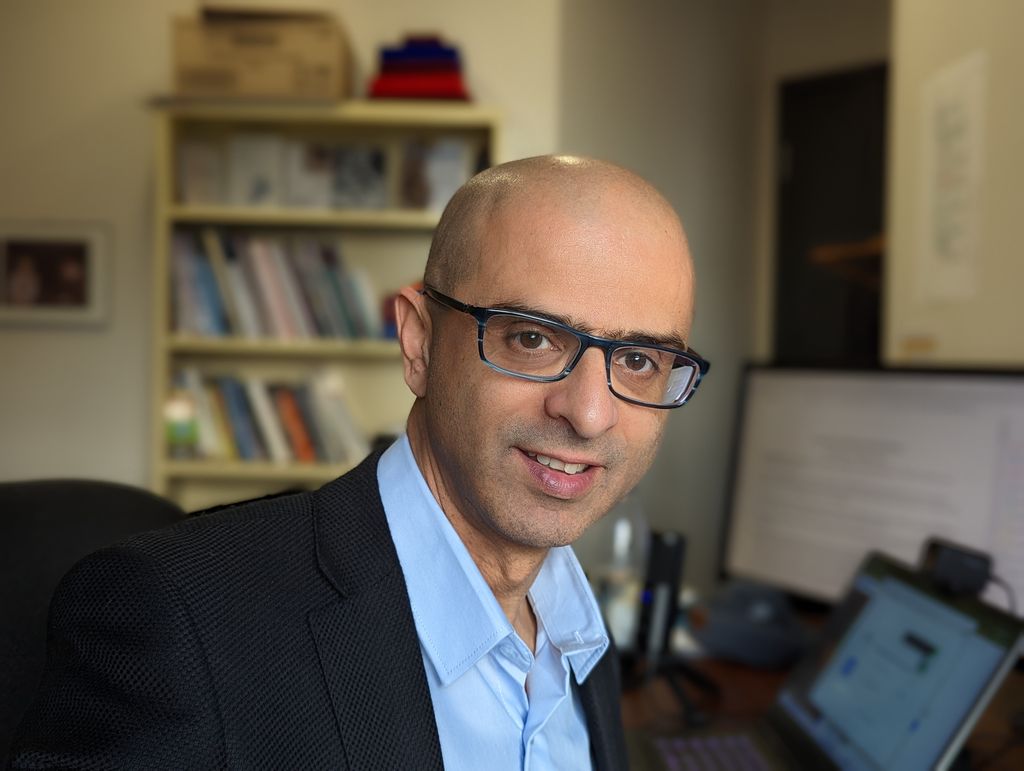Finding a Home in Electroacoustic Music
Through the laptop orchestra he founded, Eldad Tsabary has found a home in electroacoustic music

Photo by Caroline Campeau
Muse
Through the laptop orchestra he founded, Eldad Tsabary has found a home in electroacoustic music
Sound designers and creators of electroacoustic music—which requires the aid of electronic technology, such as a computer—“are masters of solitary studio work,” according to Eldad Tsabary, chair and associate professor of music at Concordia University in Montreal. The Concordia Laptop Orchestra (known as CLOrk) brings those musicians “out of their dungeons” and into a world of improvisation and collaboration with each other and audiences that is redefining the boundaries of electroacoustic music, says Tsabary, who founded the group in 2010.
At 21, after growing up in Petah Tikva, Israel, Tsabary (’13) spent three months backpacking in the Canadian Yukon, and with it, he embarked on a journey of musical discovery. He’d started playing the organ at six and later switched to the flute, concentrating on flute performance at the Rimon School of Jazz and Contemporary Music; he moved to New York City to study composition under renowned music theorist Carl Schachter at The New School’s Mannes School of Music; and he started a PhD in composition at City University of New York. Over time, his interests shifted, from composing music for and playing traditional instruments to more electronic forms of sound. He earned a continuing education degree in computer-assisted sound design from Montreal-based Musitechnic Formation in 2004 and started teaching courses on sound and electroacoustics at Concordia University in 2005.

Tsabary has found a home in the musical subgenre of electroacoustics. On his way to earning a doctorate in music education at CFA, he wrote his dissertation on ear training for electroacoustics. “BU was much more in line with my interest in music as a channel for community, for people, for collaboration,” Tsabary reflects.
CLOrk, which Concordia students take as a course and follows in the footsteps of the pioneering laptop orchestra at Princeton University, allows Tsabary to bring together all his musical interests. The orchestra has performed at festivals around eastern Canada, the Hong Kong Freespace Jazz Fest, Cambridge Festival, and many others. With their laptops open in front of them and speakers surrounding the audience, musicians create sounds and beats in audio softwares of their choosing. Sometimes a musical set will have a predefined structure to prevent it from becoming a “ball of sound,” and sometimes Tsabary conducts. But frequently, he prefers to see what the musicians come up with on their own.
Listen to this performance by the Concordia Laptop Orchestra. Courtesy of Concordia Department of Music
“What I find most driving is getting a platform for cooperation,” he says. “I have my ideas, but I don’t want to force them on others in this setting. I’m much more interested in the ground-up process of how people find ways to cooperate…and make sound together, or new ways to interact. Sound exploration is fun, but the human part to me is kind of like the glue.”
This Series
Also in
Muse
-
January 15, 2025
How Nordic cow-calling traditions inspire composer Lara Poe
-
May 27, 2024
Mindful Music
-
October 11, 2022
Heading to the Playground for Some Recess Therapy

